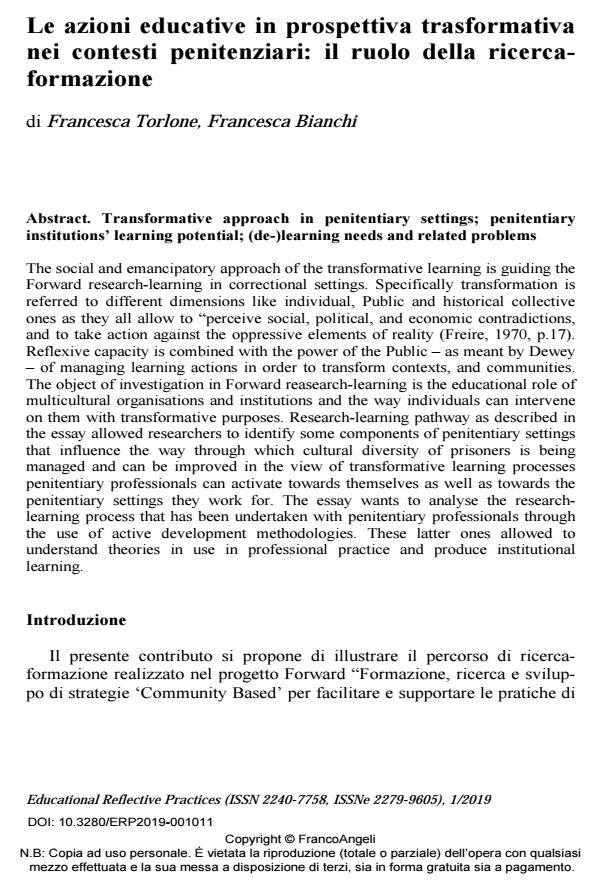Transformative approach in penitentiary settings; penitentiary institutions’ learning potential; (de-)learning needs and related problems
Journal title EDUCATIONAL REFLECTIVE PRACTICES
Author/s Francesca Torlone, Francesca Bianchi
Publishing Year 2020 Issue 2019/1
Language Italian Pages 20 P. 173-192 File size 257 KB
DOI 10.3280/ERP2019-001011
DOI is like a bar code for intellectual property: to have more infomation
click here
Below, you can see the article first page
If you want to buy this article in PDF format, you can do it, following the instructions to buy download credits

FrancoAngeli is member of Publishers International Linking Association, Inc (PILA), a not-for-profit association which run the CrossRef service enabling links to and from online scholarly content.
The social and emancipatory approach of the transformative learning is guiding the Forward research-learning in correctional settings. Specifically transformation is referred to different dimensions like individual, Public and historical collective ones as they all allow to perceive social, political, and economic contradictions, and to take action against the oppressive elements of reality (Freire, 1970, p.17). Reflexive capacity is combined with the power of the Public - as meant by Dewey - of managing learning actions in order to transform contexts, and communities. The object of investigation in Forward reasearch-learning is the educational role of multicultural organisations and institutions and the way individuals can intervene on them with transformative purposes. Research-learning pathway as described in the essay allowed researchers to identify some components of penitentiary settings that influence the way through which cultural diversity of prisoners is being managed and can be improved in the view of transformative learning processes penitentiary professionals can activate towards themselves as well as towards the penitentiary settings they work for. The essay wants to analyse the research-learning process that has been undertaken with penitentiary professionals through the use of active development methodologies. These latter ones allowed to understand theories in use in professional practice and produce institutional learning.
- Vita quotidiana in carcere: attori, discorsi, relazioni Francesca Bianchi, in EDUCATIONAL REFLECTIVE PRACTICES 1/2020 pp.117
DOI: 10.3280/ERP2020-001006 - La formazione incorporata nei contesti lavorativi (ISBN:978-88-5518-324-6)
- Lavoro e apprendimento trasformativo in carcere Francesca Torlone, Paolo Federighi, in EDUCATIONAL REFLECTIVE PRACTICES 2/2021 pp.5
DOI: 10.3280/ERP2020-002001
Francesca Torlone, Francesca Bianchi, Le azioni educative in prospettiva trasformativa nei contesti penitenziari: il ruolo della ricercaformazione in "EDUCATIONAL REFLECTIVE PRACTICES" 1/2019, pp 173-192, DOI: 10.3280/ERP2019-001011